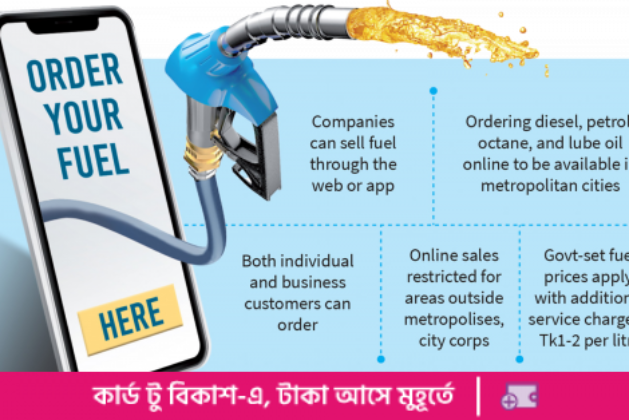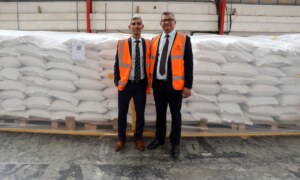From homes to factories, the new policy covers fuel delivery for a wide range of needs, including residential buildings, commercial establishments, government offices, commercial generators, heavy construction equipment, and industrial plants
Residents of major cities in Bangladesh will soon be able to ditch the long gas station lines and order fuel oil straight to their doorstep! The government has approved a new policy, allowing online sales and home delivery of diesel, petrol, octane, and lubricant oil.
From homes to factories, the new policy covers fuel delivery for a wide range of needs, including residential buildings, commercial establishments, government offices, commercial generators, heavy construction equipment, and industrial plants.
The Energy Division issued a gazette on the “Policy on Appointment of Dealers/Suppliers for Sale/Supply of Fuel Products in mobile mode through the Use of Digital Technology, 2024” on 3 January.
According to the policy, online fuel delivery will be limited to designated city corporations or metropolitan areas in Dhaka, Chattogram, Khulna, Rajshahi, Sylhet, Mymensingh, Barishal, Rangpur, Cumilla, Narayanganj and Gazipur.
Residents outside these areas will not have access to online fuel.
Customers in designated areas can purchase fuel oil at the government-set price, with an additional service charge based on the delivery distance.
Fuel oil will be delivered by companies approved by the Bangladesh Petroleum Corporation (BPC) in either tank lorries or jerrycans, with a service charge capped at Tk1 per litre for tanker deliveries and Tk2 per litre for jerrycans.
Energy Division officials said shifting fuel needs and busy schedules are driving the demand for online fuel delivery. As industrial activity and residential fuel consumption increase, individuals and businesses lack the time to manage fuel purchases themselves. This new service offers a convenient solution, eliminating queues and unreliable suppliers.
Energy Secretary Nurul Alam told The Business Standard said online fuel oil delivery is available in many countries around the globe and such a system is in alignment with Bangladesh’s existing digital infrastructure. This initiative aims to improve fuel accessibility for consumers and encourages uptake from fuel users.
Citing concerns about misuse led to the ban on open fuel oil sales from pumps, the energy secretary said, “Our online ordering system will be designed with security in mind. Customers must register on the app or Web Link, providing detailed information. This ensures transparent tracking and minimises the risk of misuse.”
The online fuel sale model follows existing models like India’s Door-to-Door diesel delivery programme and Bangladesh’s liquid petroleum (LP) gas home delivery.
According to BPC data, in FY23, 5.63% of total diesel sales, amounting to 413,550 tonnes, went to the industrial sector and 0.97% or 71,228 tonnes went to households or the residential sector.
Notably, most of the fuel oil sold to both industries and households remains within the open trading system. Additionally, the Pack Point Dealership system serves as another nationwide distribution channel for fuel oil.
BPC Director (marketing) Anupam Barua told TBS that the policy has been developed mainly keeping the industrial and residential needs in mind.
“There is a lot of demand for fuel oil in the country’s industries. Many establishments use 50-200 litres of fuel oil per day. Most houses in the city run generators during blackouts or for other needs, which also require fuel oil. The owners of these industrial establishments and residential buildings have to collect oil from pumps,” he said.
Analysis shows a clear need for convenient fuel access for industries and households, said the BPC director, adding that this policy directly addresses this need, simplifying fuel procurement for homes and businesses, which in turn benefits other sectors as well.
Businesses welcome the policy
Recognising the need for modernising fuel retail, Sajjad Karim Kabul, president of the Bangladesh Petrol Pump Owners Association, welcomed the government’s policy shift towards online fuel delivery. He said, “The time has come to embrace new marketing systems that address evolving consumer needs.”
“The online fuel oil ordering concept holds promise, but challenges like secure payment options, reliable delivery infrastructure, precise measurement techniques, and maintaining quality standards throughout the process must be tackled head-on for successful implementation,” Sajjad Karim added.
AHM Hasinul Quddus, the chief corporate affairs officer of Daraz, the country’s leading e-commerce platform, told TBS, “We appreciate the government’s initiative to digitise the sale of fuel oil to make consumer’s life easy. We believe this will expedite the government’s initiative towards a Smart Bangladesh.”
“However, to make this initiative a success, the relevant online businesses should have the necessary readiness as per the guidelines. Initially, we can run this business on a trial basis in collaboration with the distributors and the government should also take necessary measures to incentivise such business efforts,” he added.
Mohammad Sahab Uddin, vice president of the e-Commerce Association of Bangladesh, said this policy has opened a new window in e-commerce.
“Doors are opening for new entrepreneurs, and existing players can explore exciting new business avenues. It’s a win-win for everyone,” he added.
Which companies can sell fuel oil online?
The online fuel delivery system welcomes participation from existing fuel oil vendors and other entities, both companies and individuals.
However, all interested in supplying fuel under this system must be registered with the ICT Department or Bangladesh Computer Council and possess a valid Digital Business Identity Number (DBIN).
Their trade license must explicitly mention online marketing or e-commerce, and their annual turnover must have exceeded Tk3 crore in the previous three years.
Besides, the paid-up capital of these companies should be 10 lakhs in the registration of The Registrar of Joint Stock Companies and Firms (RJSC).
In addition to the trade license and turnover requirements, companies participating in online fuel delivery must have a minimum paid-up capital of Tk10 lakh, as verified by the Registrar of Joint Stock Companies and Firms (RJSC).
These companies have to be members of recognised industry associations such as the Federation of Bangladesh Chamber of Commerce and Industries (FBCCI), Dhaka Chamber of Commerce and Industry (DCCI), or the E-Commerce Association of Bangladesh (e-CAB).
Additionally, they have to have their own app or web link, operational software and their own logo. They are also required to have their own transportation and storage system.
Requirements for buyers to purchase fuel online
To buy fuel online, buyers have to register on the BPC-approved company’s apps or web links.
Registration requires the following information: company/individual name, NID number, VAT registration number (optional), mobile number, and delivery location.
Payment options include bank transfers, mobile banking, and digital gateways.




Leave a comment